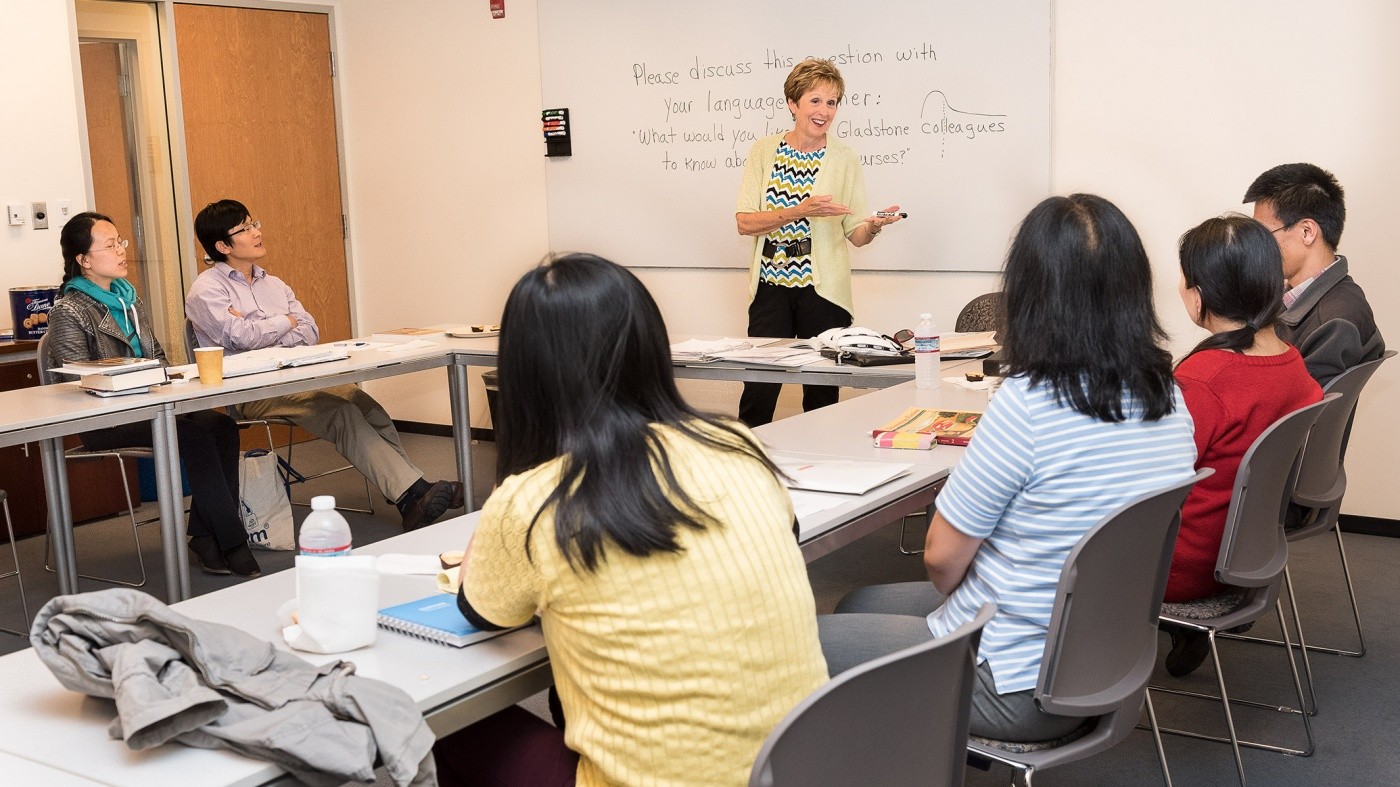Gladstone NOW: The Campaign Join Us on the Journey✕

Through English as Second Language courses, Linda Mahley helps her students adapt to US culture. [Photo: Chris Goodfellow, Gladstone Institutes]
Moving to a new country is never easy—and if you don’t speak the language, the challenge can be even greater. Simple tasks can become difficult if you don’t understand what people are saying, or if they cannot follow you when you speak.
“When I moved from Israel in 2004, I had a basic understanding of English but I was afraid to communicate,” recounted Gilad Doitsh, PhD, staff research investigator at Gladstone. “I noticed how interactions in the US were different than I was used to, and I worried about accidentally offending someone by making a mistake when I spoke. Language quickly became a huge cultural barrier.”
To counter this scenario, Linda Mahley has been offering an English as a Second Language (ESL) course at Gladstone for nearly 20 years. A certified ESL teacher trained at UC Berkeley, Linda helps new trainees and scientists who relocate to San Francisco and join Gladstone.
“Even if they previously learned English, my students often have limited vocabulary, and the rapid delivery of American speakers can be daunting,” explained Linda. “I started this program to provide them with a safe environment where they can make mistakes without feeling self-conscious. Beyond that, I wanted to help them overcome the difficulties of being a stranger in a new country with an unfamiliar language and culture.”
“Linda’s ESL course was an amazing introduction to Gladstone, and to the United States,” added Gilad, who took the course from 2004 to 2008. “She not only worked to improve our English language skills, but she also took the time to explain American culture and customs to the class. She introduced us to Thanksgiving, Christmas, and Halloween, which made us feel more integrated into the community.”
In addition to vocabulary, pronunciation, and grammar, the ESL courses at Gladstone teach students how to use and understand idiomatic language and slang, allowing them to follow social norms more easily.
“It’s more than just a language class for me, it’s a culture class,” said Yu Zhang, MD, PhD, a postdoctoral scholar at Gladstone currently enrolled in an ESL course. “It has been crucial in helping me overcome culture shock and adjust to local life here."
The ESL courses are also designed to support the development of scientific careers. The community of researchers and administrators at Gladstone come from all corners of the globe, and speak a wide range of languages including Vietnamese, Mandarin, Arabic, French, Korean, and German. However, the dominant language in science is English—and science requires frequent communication, whether in the form of an oral presentation or a written paper.
Through a flexible curriculum, Linda addresses different proficiency levels and provides individual attention to encourage her students to succeed.
“My objective is to build trust by creating a comfortable atmosphere for the students, which is why the class sizes are kept small,” said Linda. “Everyone speaks and participates in my class. It’s the only way they can truly benefit from it and enhance their English skills.”
“Linda created a relaxed and fun environment in her classroom,” described Gilad. “We were always smiling and having a good time, so it made it easy for us to speak and improve. Linda would listen and correct us, which was helpful because nobody else would tell us when we mispronounced words. Her course helped me better communicate in my everyday life.”
“I have been taking Linda’s course ever since I joined Gladstone, and I never missed a class,” added Yu. “She is one of the best teachers I have ever met. She takes it seriously but always makes it fun.”
“I took ESL classes for many years; I improved early on, but I stayed for the people,” recalled Gilad. “I became close friends with other students from around the world who were experiencing a new culture the same way I was. Linda’s personal involvement made all the difference. She went above and beyond any chance she could. She even met my parents and baked them a cake when they visited me in San Francisco for the first time. I will always be thankful.”

